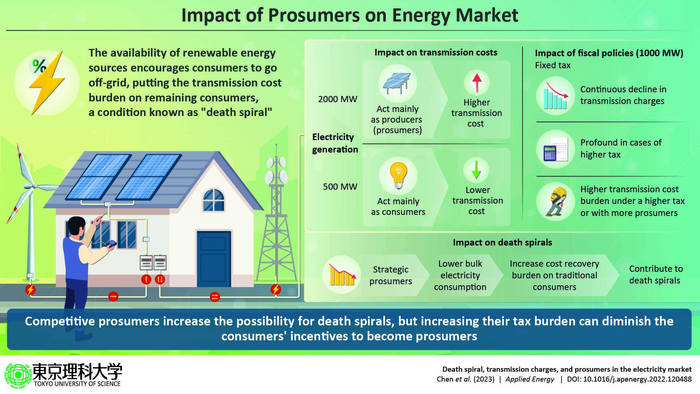Efforts to combat climate change have contributed to the rise of renewable energy production through solar panels, windmills, and other technologies. Because of this, consumers have now become “prosumers,” capable of producing their own electricity. While the prosumers’ use of distributed renewable energy increases the energy sector’s resilience, their decreased reliance on the bulk electricity market has led to new and unintended consequences.

Credit: Ryuta Takashima from Tokyo University of Science, Japan
Efforts to combat climate change have contributed to the rise of renewable energy production through solar panels, windmills, and other technologies. Because of this, consumers have now become “prosumers,” capable of producing their own electricity. While the prosumers’ use of distributed renewable energy increases the energy sector’s resilience, their decreased reliance on the bulk electricity market has led to new and unintended consequences.
It is anticipated that these avenues will push traditional consumers to become prosumers, making it difficult to recover lumpsum infrastructure investments and routine costs. This, in turn, will push the energy transmission charges to traditional, grid-dependent consumers. A vicious cycle known as “death spiral” would be created, forcing the bulk energy producers to raise the transmission charge, affecting both market and consumer equilibrium. However, despite such concerns, the impact of prosumers on transmission charges and the market has not been investigated.
A team of researchers led by Professor Ryuta Takashima of the Department of Industrial and Systems Engineering at the Tokyo University of Science, Japan recently addressed this issue. Their work was made available online on 14 December 2022 and published in Volume 332 of the Applied Energy journal on 15 February 2023. The study involved the contributions of Professor Yihsu Chen from University of California Santa Cruz, USA and Professor Makoto Tanaka from the National Graduate Institute for Policy Studies (GRIPS), Japan.
The team, in their study, extended the linear complementarity model of Nash–Cournot competition developed by Benjamin F. Hobbs to simulate bilateral markets. Prof. Takashima explains, “We explicitly considered the energy transmission network and optimization of various entities in the electricity market – consumers, prosumers, producers, and independent system operators. We assumed that a prosumer, in a perfect or imperfect competition, chooses her own method of energy production and consumption.”
The researchers used the PATH complementarity solver to tackle the market equilibrium problem they defined using the Karush–Kuhn–Tucker conditions from the above mentioned optimization problems.
Unlike the commonly held belief, the team found that the transmission charge does not, in fact, always increase with the number of prosumers. Rather, prosumers behave as consumers when generating less electricity (e.g., 500 MWh), which actually lowers the transmission charge. However, when prosumers generate a sizeable amount of renewable energy (e.g., 2000 MWh), the transmission charge goes up as anticipated.
The team also observed that the likelihood of death spirals increases with the presence of strategic prosumers, who lower their energy consumption from the bulk electricity market in the presence of imperfect competition. Based on these findings, the team suggested that it is possible to reduce the possibility of death spirals occurring by levying a per-MWh tax on the electricity consumption of prosumers from the bulk market.
In summary, the research provides valuable insights into the innate connection between the proportion of renewable energy sources and the quantity and behavior of prosumers, as well as their combined impact on the transmission charges. Prof. Takashima remarks, “In light of the growing concern over death spirals in energy market, these findings add to the ongoing discussion about transmission costs in the presence of prosumers and shed light on death spirals. Moreover, since it is expected that such a phenomenon might occur in Japan in the future, the current research can be applied to the Japanese electricity market to offer suggestions for its aversion.”
Let us hope for a more robust electricity market with affordable transmission costs!
***
Reference
DOI: https://doi.org/10.1016/j.apenergy.2022.120488
About The Tokyo University of Science
Tokyo University of Science (TUS) is a well-known and respected university, and the largest science-specialized private research university in Japan, with four campuses in central Tokyo and its suburbs and in Hokkaido. Established in 1881, the university has continually contributed to Japan’s development in science through inculcating the love for science in researchers, technicians, and educators.
With a mission of “Creating science and technology for the harmonious development of nature, human beings, and society,” TUS has undertaken a wide range of research from basic to applied science. TUS has embraced a multidisciplinary approach to research and undertaken intensive study in some of today’s most vital fields. TUS is a meritocracy where the best in science is recognized and nurtured. It is the only private university in Japan that has produced a Nobel Prize winner and the only private university in Asia to produce Nobel Prize winners within the natural sciences field.
Website: https://www.tus.ac.jp/en/mediarelations/
About Professor Ryuta Takashima from Tokyo University of Science
Ryuta Takashima is a Professor of engineering economics at the Department of Industrial and Systems Engineering in Tokyo University of Science, Japan. He received his master’s and Ph.D. from the Graduate School of Engineering at The University of Tokyo. Prof. Takashima has authored nearly 50 research papers, besides contributing to conferences, chapters, and editorials. His research interests include energy economics, especially the application of operations research, finance, and economics methods to enable the investment and operation of power generation, and energy and environmental policy. He was felicitated with the ASCE Outstanding Reviewer award in 2015.
Funding information
The research is partially supported by a US National Science Foundation grant under the contract #1832683.
Journal
Applied Energy
DOI
10.1016/j.apenergy.2022.120488
Method of Research
Computational simulation/modeling
Subject of Research
Not applicable
Article Title
Death spiral, transmission charges, and prosumers in the electricity market
Article Publication Date
15-Feb-2023
COI Statement
The authors declare the following financial interests/personal relationships which may be considered as potential competing interests: Yihsu Chen reports financial support was provided by National Science Foundation.




